S.L. Viehl's Blog, page 158
June 29, 2012
Seeing Story
Storytellers have two sets of eyes. There's the pair we use every day to navigate our way through the world, and then there are our inner eyes, through which we see all the possibilities around us. All that's needed to switch between the two is a little imagination.
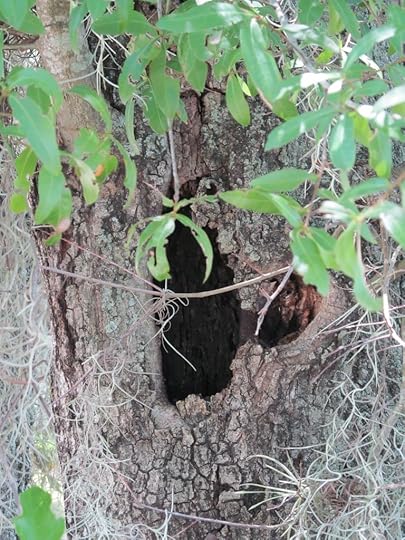
Take this tree. To everyone else it's an old tree with a hollow. To the storyteller it's a palace of surprises and secrets. What's in the hollow? A sleepy owl, a nest of baby birds, the diary a girl hides there because she never wants anyone to read it? If you reach inside the hollow, will you find a squirrel's nut stash, an old bottle containing a mysterious note, or another hand that tugs at yours?

An old stack of beat-up shipping palettes isn't very exciting. Unless you're a mouse, then it's a castle, a labyrinth, a sanctuary. Or for a kid, it's the mountain they can be king of (until someone knocks them off) -- or something much more dangerous. When I saw this I had a memoir moment, because when I was a child I climbed a stack of palettes just like this. At the time I was also barefoot, and stepped on a rusty nail. I was so worried about being scolded that I hid the wound from my mother for a week, until the fever and the red streaks running up my leg betrayed me. If Mom hadn't been as observant as she was, I might have died of blood poisoning -- all from a stack of old boring shipping palettes, just like this one.

It's not a yellow brick road, but it could be. The diamond shapes want to be counted, encoded, decoded. A game of dodge car and hopskotch, all in one. Perhaps one of the bricks is loose, and when you pry it up there will be something hidden under it, or written on the underside. When the street pavers come, as they inevitably do, what happens to all the old bricks? Do you nick some from the road construction dumpster, a couple at a time, and take them home to build something?
Story inspiration is all around you -- you just have to look at it through your other pair of eyes.

Take this tree. To everyone else it's an old tree with a hollow. To the storyteller it's a palace of surprises and secrets. What's in the hollow? A sleepy owl, a nest of baby birds, the diary a girl hides there because she never wants anyone to read it? If you reach inside the hollow, will you find a squirrel's nut stash, an old bottle containing a mysterious note, or another hand that tugs at yours?

An old stack of beat-up shipping palettes isn't very exciting. Unless you're a mouse, then it's a castle, a labyrinth, a sanctuary. Or for a kid, it's the mountain they can be king of (until someone knocks them off) -- or something much more dangerous. When I saw this I had a memoir moment, because when I was a child I climbed a stack of palettes just like this. At the time I was also barefoot, and stepped on a rusty nail. I was so worried about being scolded that I hid the wound from my mother for a week, until the fever and the red streaks running up my leg betrayed me. If Mom hadn't been as observant as she was, I might have died of blood poisoning -- all from a stack of old boring shipping palettes, just like this one.

It's not a yellow brick road, but it could be. The diamond shapes want to be counted, encoded, decoded. A game of dodge car and hopskotch, all in one. Perhaps one of the bricks is loose, and when you pry it up there will be something hidden under it, or written on the underside. When the street pavers come, as they inevitably do, what happens to all the old bricks? Do you nick some from the road construction dumpster, a couple at a time, and take them home to build something?
Story inspiration is all around you -- you just have to look at it through your other pair of eyes.
Published on June 29, 2012 21:00
June 28, 2012
Not So Blank Books
 I'm on a new quest. Yes, another one. As most of you know I've been keeping handwritten journals since 1973, and I go through a lot of them. Lately I've been making my own or buying them from journal artists over on Etsy, so it's been a while since I've checked out the mass produced variety at the book stores.
I'm on a new quest. Yes, another one. As most of you know I've been keeping handwritten journals since 1973, and I go through a lot of them. Lately I've been making my own or buying them from journal artists over on Etsy, so it's been a while since I've checked out the mass produced variety at the book stores. While I was shopping at BAM last weekend I raided the discount bins for books and discovered a pair of journals that were a bit different than the usual ruled-page blank books. This intrigued me, so during my next visit to the big B&N in the city I checked out their journal section, and found a couple more that were quite different.
I learned from my experience working with teens on Keri Smith's Wreck This Journal that a journal that comes with ideas and instructions and prompts can be more inviting to novice writers than a journal filled with empty white pages (which, let's face it, can be intimidating.) Quotes and prompts and artwork also provide focal points for the journaler to respond to versus inventing something on their own. There is no better way to get someone into the journaling habit than providing them with a guided experience. Once they build confidence, I think they'll be more prepared to take the leap onto the dreaded empty page. Thus I thought it might be fun to hunt for different types of blank books the summer and report on what I find.
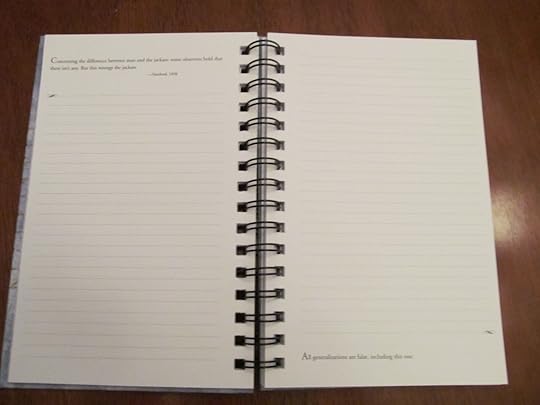
At BAM I found "The Sayings of Mark Twain" journal, published by Piccadilly, with quotations from Mr. Clemens printed on each page. The book is hardcover/spiral bound, and the pages are a nice weight, college-ruled and tinted a very light blue in keeping with the journal's color scheme. There were also other journals of the same design in different colors offering the sayings of Rumi, Buddha, and Jesus. I got my Twain for $7.97 discounted.
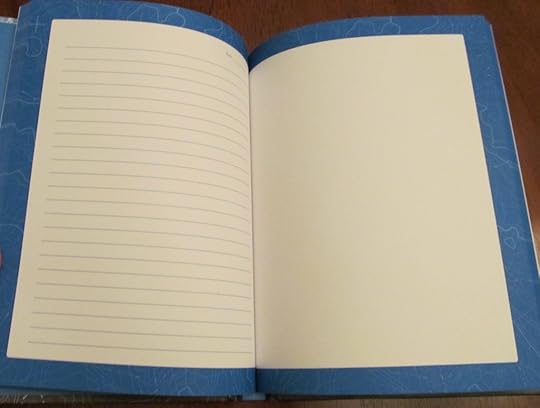
In the same bin at BAM I found "Map Your Destination", a blank book published by Retired Hipster Inc. This one is a hardcover, with color-themed bordered pages that were both ruled and blank in clusters of eight (which would make it a cool travel journal.) Nicely discounted at $5.00.
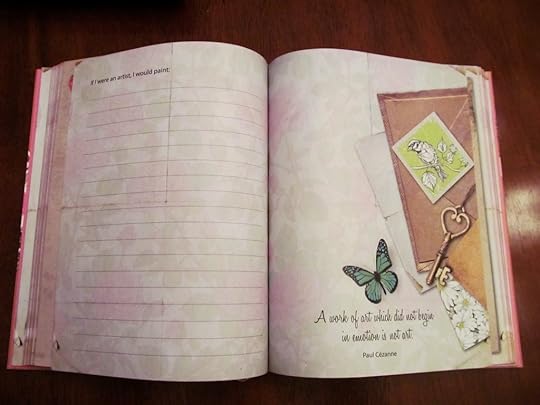
Over at B&N I noticed Parragon Books' "My Life Journal" that had decorated pages and writing prompts on at least every other page. Hardcover with really attractive pages, some filled with artwork, quotations, objects and other visual prompts that reminded me of scrapbook art. This would be an excellent journal for someone who wants to try art journaling but isn't ready to make their own pages. $6.28 with my membership card discount.
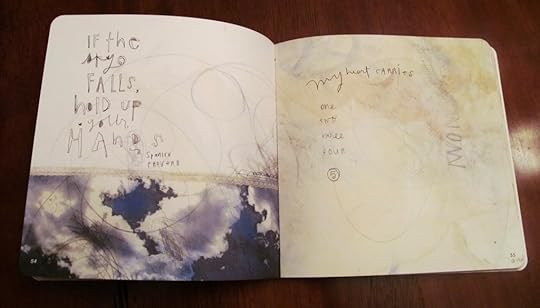
My favorite find from B&N was Sabrina Ward Harrison's The True and The Questions ~ a Journal. This is the first hybrid blank book/art book I've ever seen; it's made up partly of the author's own finished and half-finished journal pages, and pages for the reader to compose, complete or alter at will. It's an oversized trade paperback but the pages are like lightweight cardstock so it's likely very durable. If you ever wanted to collaborate on a journal with another writer or artist, this is the blank book for you. $15.25 with my membership card discount.
Have you ever used a not-so-blank book as a journal? Any type you can recommend? Let us know in comments.
Published on June 28, 2012 21:00
June 27, 2012
Short Story Sins
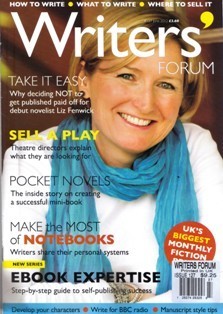 I'm currently reading the June '12 issue of
Writers' Forum
, a UK trade mag for writers that I found while rifling through the racks at my local BAM. Why it was there I can't say, except that this one BAM carries a nice selection of international mags as well as the usual domestic suspects.
I'm currently reading the June '12 issue of
Writers' Forum
, a UK trade mag for writers that I found while rifling through the racks at my local BAM. Why it was there I can't say, except that this one BAM carries a nice selection of international mags as well as the usual domestic suspects. The majority of the articles are geared toward working writers, which I liked, and while there were a few of those "Make Millions Self-Pubbing" ads the content was very refreshing -- like The Writer used to be before they went the way of Writer's Digest. There was even an article spread on using notebooks -- the write-in kind -- in different ways to aid with the work. Made me tear up a bit, to be honest.
Writers' Forum also holds a monthly fiction contest with three prizes that sounds interesting. There's a small entry fee involved (discounted 50% for subscribers) but since the magazine awards three prizes (£300, £150, and £100 respectively) each month, it might be worth it to subscribe if you're a short story writer or actively pursuing the UK markets.
In this issue the judge of the mag's monthly writing contest wrote an article on why she chose the entries that won, and in a box provided a checklist of what the mag is looking for as far as winning stories: "Originality ~ Good storytelling ~ Pace, momentum, immediacy ~ Attention-grabbing openings ~ Satisfying endings ~ Action ~ Convincing characters with their own voices ~ viewpoint control."
The judge's checklist made me ponder what I think kills a short story, which led to me putting together my own list ala the seven deadly sins:
Convention Skirt-Flouncing: How do I describe thee? Let me count a few ways: the writer refuses to use quotation marks; surreal elements that have nothing to do with the story pop up randomly, like great big honking pink elephants; there's a chick with green hair who isn't a blonde who just got out of an over-chlorinated pool -- you get the general idea. Yes, to some it's artistic, it's tres chic, whatever; it doesn't work for me. Most of it comes off less like style and more like posturing. If you're more worried about what people think of you than the story, this might be a problem.
Dull Characters: There's hardly any time for me to get to know the story's population, so in some way/shape/form they'd better knock my socks off from page 1. Too often they simply don't. To figure out if your characters are absorbing, give someone half the story and see if they come after you demanding the rest of it right now or they'll hurt you.
Improper Length: Any story over 15K words always feels to me like it's trying to be a novel, it wasn't enough to make into a novel, or it wasn't edited properly (sometimes all three.) On the flip side, unless they're perfectly structured very short stories (usually under 2K) feel unfinished. A litmus test for this is if your reader feels bored halfway through (too long), or pissed after reading the last paragraph (too short.)
Sketches Instead of Stories: About half of the short stories I read disappoint me because they're glorified character/event/setting outlines or narratives instead of real stories. The big tell for this is when you take a hard look at the action -- if you reach the end of the story and realize nothing has actually happened, you may be sketching instead of storytelling.
Tellers: the writer is so proud of the neat things that they've invented that there is no story, there's just the writer nattering on about all the stuff they think is cool. The red flag for this one is how many pages you've filled with narrative. More than 60%? Possibly a teller.
Unsympathetic Buttons: The writer wants my sympathy for an unsympathetic situation. Example: it's so horrible to be rich, privileged, summer in the Hamptons, winter in Aspen and have Daddy write a check to pay for college, yes? Maybe it is, but from my perspective and life experience, no, I don't think so. I don't want to tell anyone they are obligated to write about the downtrodden; I'm willing to believe wealthy people suffer just like the rest of us. There should be more to that suffering, however, than a pitch of woe-is-me-I'm-too-entitled.
What is the Point?: I just finished two pretty terrible anthologies (neither were written by anyone who stops in here, so relax.) Both left me feeling as if I'd squandered two decent reading days and about thirty bucks of my hard-earned $$$ for nothing. They didn't enlighten me, they didn't amuse me, they didn't teach me and they didn't even attempt to entertain me. Mostly they made me feel tired (although one tried to sneer at me, the lip-curls weren't very convincing.) If that was the point, it worked, but it's not going to sell me any more books. Unless my insomnia flares up again.
So what are some of the sins you encounter in the short stories you read? Let us know in comments.
Published on June 27, 2012 21:20
June 26, 2012
Soggy But Back
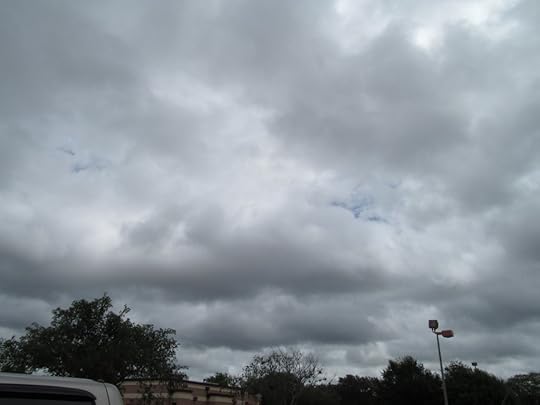
Tropical Storm Debby is still slogging her way over to the Atlantic, but we made it through okay. Lots of wind, lots of rain, but not much more than a bit of thankfully temporary flooding, and some minor tree debris scattered on the roads. The big loss was my keyboard, which weirdly decided to fry itself when I powered everything back up, but it was about time for me to get a new keyboard anyway. I hope everyone else in the storm's path made it through all right.
I've got a couple of sub ops and a self-promo op to pass along today; I got a heads-up from Rob over at from Circalit for two new writing contests they're holding, and I'll quote him here:
Launch Your Sci-fi Story into the Cosmos
"Cosmos, founded in 2004, is a literary science magazine that reaches 40,000 readers every month around the globe, and covers everything from science fact to science fiction. Cosmos are now on the lookout for innovative science fiction short stories that that make you think about the future in a different way. The winning short story will be printed in the next issue of Cosmos Magazine, and the two runners-up will see their work published on Cosmos Online." Entry is free, and you can read more info about the contest here.
Eclectica Flash Fiction Competition
"Eclectica, founded in 1996, is one of the longest running online literary publications, publishing a wide range of fiction from all different genres. Now Eclectica have teamed up with Circalit to host a flash fiction competition. Simply write a story on any theme in under 800 words and get your flash fiction published in the October/November issue of this notable ezine." Entry for this one is also free, and you can read more info about the contest here.
I also received an e-mail from the Australian Romance Readers Association about a self-promo op for authors interested in sending goodies or books for their convention in Brisbane, to be held March 1-3 next year:
"All authors are welcome to send (or bring) promotional items for display on goodie tables at ARRC2013. These items will be available to all delegates throughout the convention. Items might include bookmarks, bookplates, pens, badges, or any other promotional items. If you would like to send books, we will use these for door prizes and prize packs for games."
Our pals over in Australia are terrific folks who read a LOT of books and are very supportive of the genre, so this is a great chance for romance and romance-friendly authors to reach out to a wider audience with your promo. If you can't spring for the cost to ship actual books (which admittedly can be expensive) you might consider putting up a free story online and send bookmarks with the link. If you'd like the ship-to address and/or contact info, they can be found over at ARRA's website here.
Published on June 26, 2012 21:00
June 24, 2012
Off to Hunker Down

Debby is shaping up to be our first tropical storm of the 2012 season, so we're shutting down all the computers and devices and otherwise getting things ready here. We don't expect much more than some flooding and power outtages, but our region will likely remain under a tornado watch until it passes. I'll check in when I can. NOAA's latest advisory on Tropical Storm Debby can be found here.
Image Credit: NOAA/National Hurricane Center
Published on June 24, 2012 21:00
June 23, 2012
Summer SF Contest
Here's an interesting op for those of you who want to write SF but are having trouble finding receptive markets: Redstone Science Fiction is holding their 3rd Annual Fiction Summer Contest with a hopeful future via scientific advancement theme: "Read Sarah Einstein’s column in June 2012, RSF #25 to learn what we are looking for – “show (us) a hopeful future made better by scientific advancement.” Length: up to 5K (firm); the winning author "will be paid 5 cents per word" and their winning story "will be published in the September 2012 issue of Redstone Science Fiction." Electronic submission only, see contest page for more details, deadline August 15th, 2012.
Published on June 23, 2012 21:00
June 22, 2012
More on Smart Edit
Last week I mentioned the freeware program Smart Edit as a potential helper for writers who want to improve their editing skills. Since I can always use that, I decided to give it a personal test drive and downloaded it with no problems.
Rather than test it on a manuscript I've worked on with a professional editor (which tend to be pretty clean) I thought a better test run would be to use it to scan one of my freebie e-books, which are edited solely by me. I first converted the .docx file for Dark of Heart to text format -- the program accepts .rtf and text files -- and opened it in the program (the manuscript text appears in the center window on the program screen.) I then hit the Scan Now Icon and let it run.
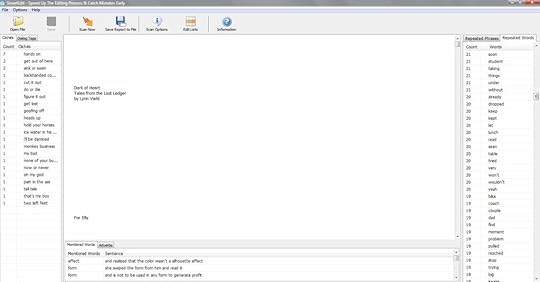
The program finished scanning the novella in about thirty seconds, and gave me several windows of information with different tabs: Cliches and Dialogue Tags in the left window, Repeated Phrases and Repeated Words in the right window, and Monitored Words and Adverbs in the bottom window (to see another, larger screen shot of my file in the program, click here.) Double click on any of the words in any of the lists and the program takes you to the first time you've used it (at which point you can delete the offending phrase and move on to the next instance of use. You do have to delete or change the phrase before you can double-click to move on to the next one.) I also discovered I could save the scan report, open it in Word and print out a copy, which was really handy as the tabbed windows with the info are small and take awhile to scroll.
The scan report came back with 20 different cliches and the number of times I used them in the novella. Apparently I'm very fond of "hands on" as I used that seven times, and "get out of here" showed up twice. The remaining eighteen phrases were only used once, and I know most of them were used in dialogue lines, so I think I did fairly well there (but if I'd had this program while I was editing the novella, I definitely would have weeded out some of those "hands on".)
I thought I also fared well on dialogue tags; I used "said" 118 times, "thought" 51 times, "told" 43 times, "asked" 28 times and "called" 26 times; all of which I think are perfectly acceptable tags (I don't belong to the school of You Must Only Use Said.) What I didn't like seeing were the 27 times I used "nodded", the 13 times I used "added" and the 11 times I used "grinned"; those are not words I like to use as frequent dialogue tags and I would have yanked them out (and I am going to look over the ms. for exactly where I used "nodded" because I don't think I used it specifically as a dialogue tag; it was probably a physical action phrase to replace one, which I'm prone to do when I get tired of said.)
I did so-so on repeated phrases; my biggest offenders were "one of the" (32 times) and "as soon as" (20 times). My single words with the most repeats surprised me; other than the main character's names (which I think should be at the top of the list) I used the word "down" 122 times, "like" 121 times, "didn't" 116 times, "before" 112 times and "could" 103 times. Two of my ongoing problematic weed words, "eyes" and "door" both came in at 37 repeats which was less than I expected but more than I liked seeing.
The one list that didn't bother me much were the adverbs I used; I didn't have that many in the novella and I'm not allergic to any of the others I used. I know there are writers who spit on adverbs and won't let a single one sully their prose; I never got that memo so I think they can be used sparingly. One thing I did want to mention is that the adverb list never printed out on the scan report, so that may be a minor bug in the program.
You can edit the words and phrases lists that the program uses for scans; you click on "Edit Lists" and when the smaller options screen appears you pick the tab for the list you want to edit to remove or add anything you want to that portion of the scan (which you can see in this screenshot.) You can also customize your scans as to what you specifically want to search for by checking or unchecking the boxes in the Scan Options window (which you can see in this screenshot.)
Smart Edit won't ever replace a real live editor, and it won't take the job of editing completely off your hands. But I do think it can be helpful for analysis purposes, not only for finding problem words and phrases you may have missed but also by identifying the ones that we as writers are prone to regularly overuse or misuse.
Rather than test it on a manuscript I've worked on with a professional editor (which tend to be pretty clean) I thought a better test run would be to use it to scan one of my freebie e-books, which are edited solely by me. I first converted the .docx file for Dark of Heart to text format -- the program accepts .rtf and text files -- and opened it in the program (the manuscript text appears in the center window on the program screen.) I then hit the Scan Now Icon and let it run.

The program finished scanning the novella in about thirty seconds, and gave me several windows of information with different tabs: Cliches and Dialogue Tags in the left window, Repeated Phrases and Repeated Words in the right window, and Monitored Words and Adverbs in the bottom window (to see another, larger screen shot of my file in the program, click here.) Double click on any of the words in any of the lists and the program takes you to the first time you've used it (at which point you can delete the offending phrase and move on to the next instance of use. You do have to delete or change the phrase before you can double-click to move on to the next one.) I also discovered I could save the scan report, open it in Word and print out a copy, which was really handy as the tabbed windows with the info are small and take awhile to scroll.
The scan report came back with 20 different cliches and the number of times I used them in the novella. Apparently I'm very fond of "hands on" as I used that seven times, and "get out of here" showed up twice. The remaining eighteen phrases were only used once, and I know most of them were used in dialogue lines, so I think I did fairly well there (but if I'd had this program while I was editing the novella, I definitely would have weeded out some of those "hands on".)
I thought I also fared well on dialogue tags; I used "said" 118 times, "thought" 51 times, "told" 43 times, "asked" 28 times and "called" 26 times; all of which I think are perfectly acceptable tags (I don't belong to the school of You Must Only Use Said.) What I didn't like seeing were the 27 times I used "nodded", the 13 times I used "added" and the 11 times I used "grinned"; those are not words I like to use as frequent dialogue tags and I would have yanked them out (and I am going to look over the ms. for exactly where I used "nodded" because I don't think I used it specifically as a dialogue tag; it was probably a physical action phrase to replace one, which I'm prone to do when I get tired of said.)
I did so-so on repeated phrases; my biggest offenders were "one of the" (32 times) and "as soon as" (20 times). My single words with the most repeats surprised me; other than the main character's names (which I think should be at the top of the list) I used the word "down" 122 times, "like" 121 times, "didn't" 116 times, "before" 112 times and "could" 103 times. Two of my ongoing problematic weed words, "eyes" and "door" both came in at 37 repeats which was less than I expected but more than I liked seeing.
The one list that didn't bother me much were the adverbs I used; I didn't have that many in the novella and I'm not allergic to any of the others I used. I know there are writers who spit on adverbs and won't let a single one sully their prose; I never got that memo so I think they can be used sparingly. One thing I did want to mention is that the adverb list never printed out on the scan report, so that may be a minor bug in the program.
You can edit the words and phrases lists that the program uses for scans; you click on "Edit Lists" and when the smaller options screen appears you pick the tab for the list you want to edit to remove or add anything you want to that portion of the scan (which you can see in this screenshot.) You can also customize your scans as to what you specifically want to search for by checking or unchecking the boxes in the Scan Options window (which you can see in this screenshot.)
Smart Edit won't ever replace a real live editor, and it won't take the job of editing completely off your hands. But I do think it can be helpful for analysis purposes, not only for finding problem words and phrases you may have missed but also by identifying the ones that we as writers are prone to regularly overuse or misuse.
Published on June 22, 2012 21:00
June 21, 2012
Wandering for the Well
 After two months of working sixteen hour days to finish up the Lords of the Darkyn trilogy, outline some new proposals, deal with family dropping in, the computer crashing, the nesting dove dive-bombing anyone who came near the front door and various and sundry other domestic crises, I needed a day off. Mostly I needed to shut off the computer, turn off the phones and leave the house so I could reset my head, recharge my batteries and restock the well.
After two months of working sixteen hour days to finish up the Lords of the Darkyn trilogy, outline some new proposals, deal with family dropping in, the computer crashing, the nesting dove dive-bombing anyone who came near the front door and various and sundry other domestic crises, I needed a day off. Mostly I needed to shut off the computer, turn off the phones and leave the house so I could reset my head, recharge my batteries and restock the well.You know that term writers always use for random inspiration: everything is grist for the mill? That one has never worked for me because as demanding as writing can be, the inspiration for it has never been grinding or crushing. It flows, like water from the world to a fountain within. My creativity also feeds itself, in the same way a fountain works. I get a rush of ideas, I pour them out, they pool and percolate and recirculate and then pour out into another rush of new ideas. As a storyteller I'm never finished, not really. One thing always leads to another, and even when I'm ending one thing there's already something else in the works or brewing or that I'm prepared to begin. I don't question or mess with this because it's my natural process and frankly I don't want to jinx it.
My well has never run dry, but it does work overtime and every now and then it needs repriming. I get bored and I need something fresh to add to the waters. Going out into the world and searching for it is fun and keeps me from becoming stagnant. I also have a proposal that I need to finalize and get to the agent, one that I wanted to let percolate. So when I decided to take my day off, I grabbed my kid and we spent a day out together shopping and hanging out and generally wandering around doing nothing in particular.
 When you open yourself up to the universe of possibility around you, wherever you are, you'll find inspiration. Mine came in the form of a little out of the way park where we spotted this interesting tree. It was huge, old, and appeared to be engaged in a battle with some sort of vine. I'm not an expert, but I think the vine already lost, because when we walked up to it the vine appeared dead, and the tree looked pretty smug.
When you open yourself up to the universe of possibility around you, wherever you are, you'll find inspiration. Mine came in the form of a little out of the way park where we spotted this interesting tree. It was huge, old, and appeared to be engaged in a battle with some sort of vine. I'm not an expert, but I think the vine already lost, because when we walked up to it the vine appeared dead, and the tree looked pretty smug. While I was taking photographs from different angles, my daughter noticed something, and called me over. There was a short length of rusty chain embedded in the trunk of the tree. The chain was on the road side of the tree, and there were no other trees nearby, so it couldn't have been from a hammock. I didn't think anyone heartless enough to chain some poor pup to the tree would do so within a few feet of a road, either. The chain was an interesting mystery, especially because it looked like there might be more of it inside the tree -- and as I thought that, I thought of the proposal idea, and how I could use the ideas from the tree to cement one side of the story.
While I was taking photographs from different angles, my daughter noticed something, and called me over. There was a short length of rusty chain embedded in the trunk of the tree. The chain was on the road side of the tree, and there were no other trees nearby, so it couldn't have been from a hammock. I didn't think anyone heartless enough to chain some poor pup to the tree would do so within a few feet of a road, either. The chain was an interesting mystery, especially because it looked like there might be more of it inside the tree -- and as I thought that, I thought of the proposal idea, and how I could use the ideas from the tree to cement one side of the story. From there we walked through the park, where we came across several signs warning us of low-flying hawks. I've never seen a warning sign for birds, so this tickled me. I want one for my dove now. And sure enough, as we made our way along the walk we saw a beautiful hawk soar over our heads, and paused to listen to its piercing call. Why were the hawk and his pals hanging out in this pristine, pretty little park? What if it had something to do with that old warrior tree? And in my head, another side of the story idea went from slightly muddled to almost painfully clear.
From there we walked through the park, where we came across several signs warning us of low-flying hawks. I've never seen a warning sign for birds, so this tickled me. I want one for my dove now. And sure enough, as we made our way along the walk we saw a beautiful hawk soar over our heads, and paused to listen to its piercing call. Why were the hawk and his pals hanging out in this pristine, pretty little park? What if it had something to do with that old warrior tree? And in my head, another side of the story idea went from slightly muddled to almost painfully clear.A few minutes later we came upon a sudden burst of bleeding heart vines, all tangled up with the otherwise politely manicured landscaping:

The splash of color and the chaos of blooms brought me to a standstill. Unless he was lousy at his job, the groundskeeper couldn't have planted them like that, not with everything else so perfectly arranged and trimmed. Seeing this beautiful, delicate thing growing wild twined itself around the third and final side of the story triad I'd been unhappy with, and the proposal crystallized. If I'd had a computer with me, I could have written it right there and e-mailed it off to New York.
 The rush of all these new ideas tempted me to tackle one final problem I'd been having with the proposal, namely the series title. I've been tinkering endless with that, and I came up with one that was almost, but not quite, fitting. It's a single word, I coined it myself, and it names the universe, the storyline, the setting, the characters, the whole shebang -- almost.
The rush of all these new ideas tempted me to tackle one final problem I'd been having with the proposal, namely the series title. I've been tinkering endless with that, and I came up with one that was almost, but not quite, fitting. It's a single word, I coined it myself, and it names the universe, the storyline, the setting, the characters, the whole shebang -- almost. Even as great as my day had been going, I wasn't getting my hopes up. I'd spent almost a month hammering away at that title, and I'd been so close to nailing it that I could practically feel the right version of it hovering in the back of my head. I felt like I was pushing it, too -- I'd gotten plenty for the well and my story from the tree and the hawk and the flower, but to expect the universe to hand me the perfect series title during my day off? That was never going to happen. Never. Never.
And then, just like that, I had the title.
Tomorrow I'm going to clean my house, catch up on laundry, spend time with my family, and not rush to the keyboard to type up everything in my head. It's tempting, believe me, but it's also foolish to rush the rush. The well is definitely refreshed, and ready to pour itself out on the page, but all the new ideas need time to cascade and pool and percolate and cycle through a few times. I do, too. I want to spend a few days resting and relaxing and wondering a bit more. The well isn't going anywhere, and neither am I.
Published on June 21, 2012 21:00
June 20, 2012
Much Better Now
I'm (finally!) back online and now dealing with all the work stuff and e-mails that piled up while I was tinkering.
While I'm catching up, here is an artful video about a bookmark with a secret life. It has background music, amazing animation and the best ending ever:

While I'm catching up, here is an artful video about a bookmark with a secret life. It has background music, amazing animation and the best ending ever:
Much Better Now from Salon Alpin on Vimeo.
Published on June 20, 2012 19:24
June 18, 2012
Off to Tinker

I have to replace the hard drive on my internet computer today, so I'll be unplugged until I download all the updates and transfer my backups (have you backed up lately? If not, go, do it now.) I should be back up and running by tonight, and I apologize for any inconvenience this causes.
Published on June 18, 2012 08:13
S.L. Viehl's Blog
- S.L. Viehl's profile
- 224 followers
S.L. Viehl isn't a Goodreads Author
(yet),
but they
do have a blog,
so here are some recent posts imported from
their feed.



